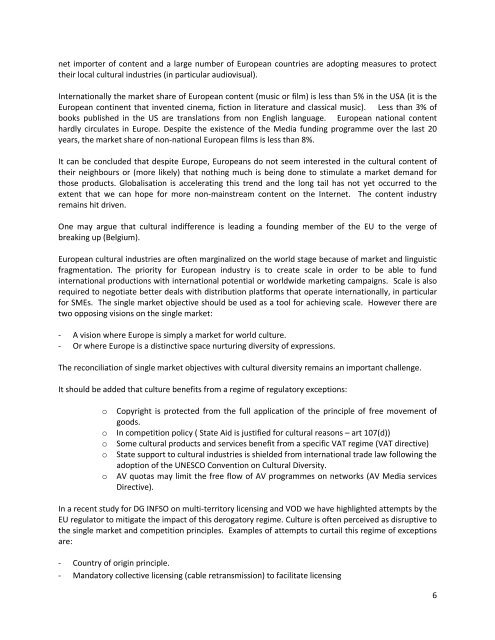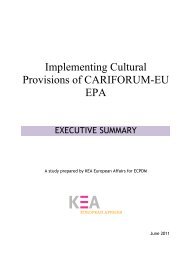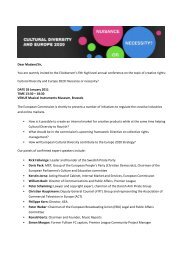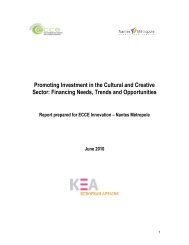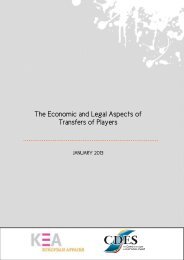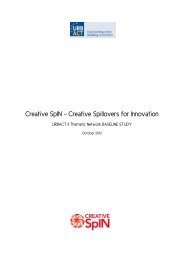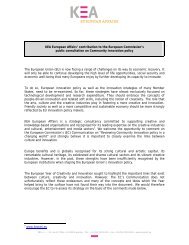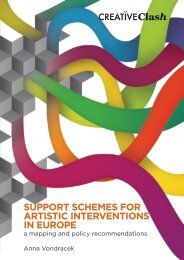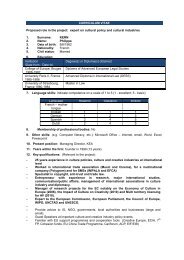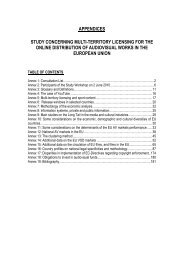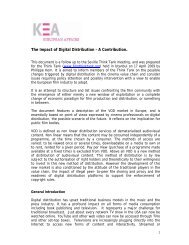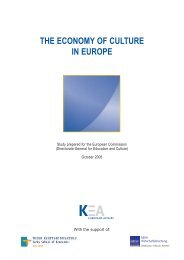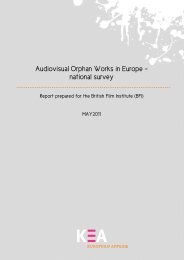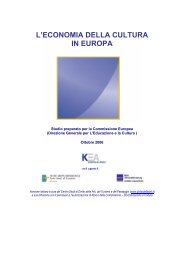Cultural Diversity and EU 2020 - Presentation Philippe Kern at ... - KEA
Cultural Diversity and EU 2020 - Presentation Philippe Kern at ... - KEA
Cultural Diversity and EU 2020 - Presentation Philippe Kern at ... - KEA
Create successful ePaper yourself
Turn your PDF publications into a flip-book with our unique Google optimized e-Paper software.
net importer of content <strong>and</strong> a large number of European countries are adopting measures to protect<br />
their local cultural industries (in particular audiovisual).<br />
Intern<strong>at</strong>ionally the market share of European content (music or film) is less than 5% in the USA (it is the<br />
European continent th<strong>at</strong> invented cinema, fiction in liter<strong>at</strong>ure <strong>and</strong> classical music). Less than 3% of<br />
books published in the US are transl<strong>at</strong>ions from non English language. European n<strong>at</strong>ional content<br />
hardly circul<strong>at</strong>es in Europe. Despite the existence of the Media funding programme over the last 20<br />
years, the market share of non-n<strong>at</strong>ional European films is less than 8%.<br />
It can be concluded th<strong>at</strong> despite Europe, Europeans do not seem interested in the cultural content of<br />
their neighbours or (more likely) th<strong>at</strong> nothing much is being done to stimul<strong>at</strong>e a market dem<strong>and</strong> for<br />
those products. Globalis<strong>at</strong>ion is acceler<strong>at</strong>ing this trend <strong>and</strong> the long tail has not yet occurred to the<br />
extent th<strong>at</strong> we can hope for more non-mainstream content on the Internet. The content industry<br />
remains hit driven.<br />
One may argue th<strong>at</strong> cultural indifference is leading a founding member of the <strong>EU</strong> to the verge of<br />
breaking up (Belgium).<br />
European cultural industries are often marginalized on the world stage because of market <strong>and</strong> linguistic<br />
fragment<strong>at</strong>ion. The priority for European industry is to cre<strong>at</strong>e scale in order to be able to fund<br />
intern<strong>at</strong>ional productions with intern<strong>at</strong>ional potential or worldwide marketing campaigns. Scale is also<br />
required to negoti<strong>at</strong>e better deals with distribution pl<strong>at</strong>forms th<strong>at</strong> oper<strong>at</strong>e intern<strong>at</strong>ionally, in particular<br />
for SMEs. The single market objective should be used as a tool for achieving scale. However there are<br />
two opposing visions on the single market:<br />
- A vision where Europe is simply a market for world culture.<br />
- Or where Europe is a distinctive space nurturing diversity of expressions.<br />
The reconcili<strong>at</strong>ion of single market objectives with cultural diversity remains an important challenge.<br />
It should be added th<strong>at</strong> culture benefits from a regime of regul<strong>at</strong>ory exceptions:<br />
o Copyright is protected from the full applic<strong>at</strong>ion of the principle of free movement of<br />
goods.<br />
o In competition policy ( St<strong>at</strong>e Aid is justified for cultural reasons – art 107(d))<br />
o Some cultural products <strong>and</strong> services benefit from a specific VAT regime (VAT directive)<br />
o St<strong>at</strong>e support to cultural industries is shielded from intern<strong>at</strong>ional trade law following the<br />
adoption of the UNESCO Convention on <strong>Cultural</strong> <strong>Diversity</strong>.<br />
o AV quotas may limit the free flow of AV programmes on networks (AV Media services<br />
Directive).<br />
In a recent study for DG INFSO on multi-territory licensing <strong>and</strong> VOD we have highlighted <strong>at</strong>tempts by the<br />
<strong>EU</strong> regul<strong>at</strong>or to mitig<strong>at</strong>e the impact of this derog<strong>at</strong>ory regime. Culture is often perceived as disruptive to<br />
the single market <strong>and</strong> competition principles. Examples of <strong>at</strong>tempts to curtail this regime of exceptions<br />
are:<br />
- Country of origin principle.<br />
- M<strong>and</strong><strong>at</strong>ory collective licensing (cable retransmission) to facilit<strong>at</strong>e licensing<br />
6


